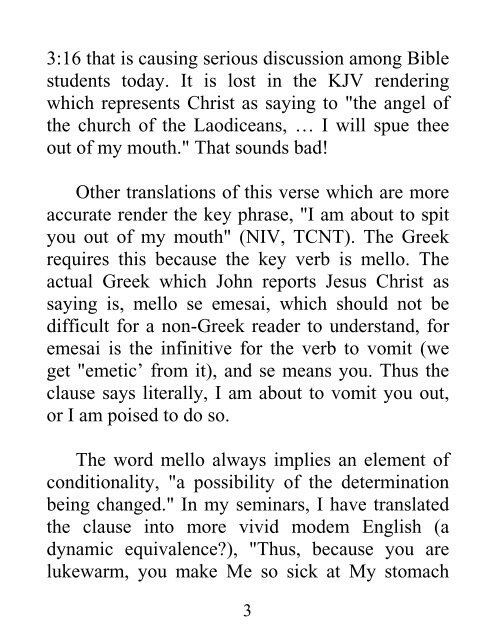Has Christ Rejected or Forsaken the Organized Seventh-day Adventist Church - Robert J. Wieland
Create successful ePaper yourself
Turn your PDF publications into a flip-book with our unique Google optimized e-Paper software.
3:16 that is causing serious discussion among Bible<br />
students to<strong>day</strong>. It is lost in <strong>the</strong> KJV rendering<br />
which represents <strong>Christ</strong> as saying to "<strong>the</strong> angel of<br />
<strong>the</strong> church of <strong>the</strong> Laodiceans, … I will spue <strong>the</strong>e<br />
out of my mouth." That sounds bad!<br />
O<strong>the</strong>r translations of this verse which are m<strong>or</strong>e<br />
accurate render <strong>the</strong> key phrase, "I am about to spit<br />
you out of my mouth" (NIV, TCNT). The Greek<br />
requires this because <strong>the</strong> key verb is mello. The<br />
actual Greek which John rep<strong>or</strong>ts Jesus <strong>Christ</strong> as<br />
saying is, mello se emesai, which should not be<br />
difficult f<strong>or</strong> a non-Greek reader to understand, f<strong>or</strong><br />
emesai is <strong>the</strong> infinitive f<strong>or</strong> <strong>the</strong> verb to vomit (we<br />
get "emetic’ from it), and se means you. Thus <strong>the</strong><br />
clause says literally, I am about to vomit you out,<br />
<strong>or</strong> I am poised to do so.<br />
The w<strong>or</strong>d mello always implies an element of<br />
conditionality, "a possibility of <strong>the</strong> determination<br />
being changed." In my seminars, I have translated<br />
<strong>the</strong> clause into m<strong>or</strong>e vivid modem English (a<br />
dynamic equivalence?), "Thus, because you are<br />
lukewarm, you make Me so sick at My stomach<br />
3

















